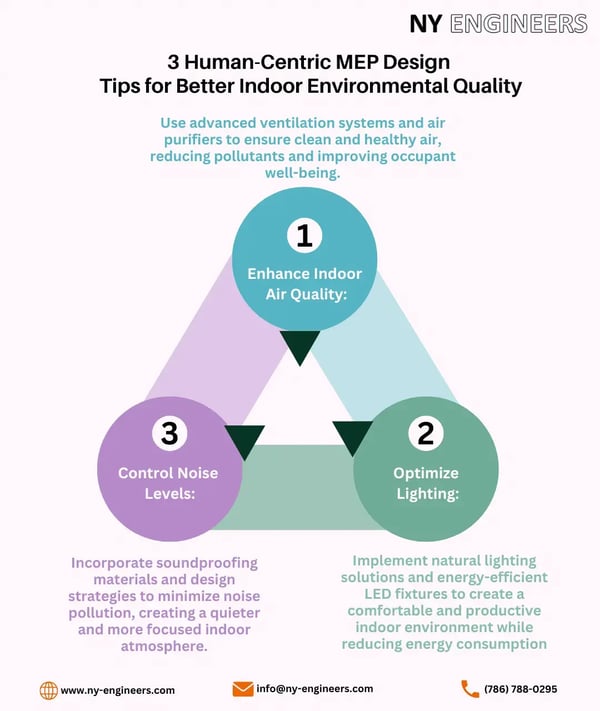3 Human-Centric MEP Design Tips for Better Indoor Environmental Quality

Good home design goes beyond more functionality. Many homes might look attractive in appearance, but the actual living experience can be less than ideal. What’s more, people today have come to expect a number of features that improve quality of life.
Data shows that 70% of survey respondents felt smart technologies can make life at home easier. Mechanical, electrical, and plumbing engineers (MEP) face a number of challenging tasks ahead of them in home construction and design.
Nowadays, finding work, even for those who have completed engineering master’s programs, can be difficult.
According to EducatingEngineers.com, the market has become highly competitive, and higher education is critical to secure good positions.
Demonstrating exceptional skills in MEP engineering will be critical for a stable career. In this article, let us explore three tips regarding indoor environmental quality that new MEP engineers can benefit from.
1. Plan Thermal Control Effectively: Active vs. Passive Strategies
One of the biggest determiners of a great home environment is thermal comfort. Studies have shown that productivity and performance increase when a person is exposed to a comfortable temperature. MEP engineers need to pay close attention to the many factors that can affect thermal comfort.
Many engineers over-rely on passive strategies for temperature control. Don’t get us wrong, building orientation, solar influence, natural ventilation, roof, and wall design are all relevant aspects.
However, an HVAC system might also be needed. Learn about and use tools like occupancy sensors, which adjust HVAC settings in unoccupied spaces. Such steps can also help reduce the load on the system and make things more efficient.
Depending on the building’s purpose, choosing which option to use (passive or active temperature control) might be a tough decision. In some situations, engineers will have to carefully assess whether a combination of HVAC and passive strategies will be needed.

2. Don’t Overlook Noise Isolation
Noise pollution is a major issue that more people are starting to take seriously. According to the Environmental Protection Agency (EPA), noise pollution can affect blood pressure, increase stress and affect productivity.
MEP engineers often underestimate noise sources during the design phase. Generally speaking, it is difficult to address these issues once construction is complete. Thus, it’s important to address acoustic concerns early on.
Predicting issues like mechanical vibration and taking steps to isolate them with either isolation mounts or dampers will be critical. Such vibrations can come from HVAC systems, elevators, generators, water flow through pipes, and even footsteps. It can be helpful to collaborate with architects to better understand room acoustics early on.
3. Pay Close Attention to Indoor Air Quality
The National Institute of Environmental Health Sciences states that indoor air quality is a global issue. While most people will not experience air pollution severe enough to kill them, it can still adversely affect health.
It can also affect general life by causing people to take sick days and killing productivity overall. Less experienced MEP engineers often make a number of minor mistakes and oversights that can become an issue.
For instance, an over-reliance on recirculation without adequate filtration. In such a situation, a buildup of pollutants occurs, and air quality is significantly impacted. Similarly, they may forget to think about humidity control, proper ventilation inlet placement, and educating occupants.
What do we mean by educating occupants? Well, this involves explaining how to minimize the introduction of indoor pollutants through human actions.
Avoiding smoking indoors and keeping doors and windows closed when HVAC systems are active is important information. A lot of people tend to be clueless about these aspects. To be on the safer side, engineers should provide proper guidelines to occupants.
It’s good to remember that air pollution is not a laughing matter. Poor indoor air quality causes over 3.2 million deaths annually. Thus, treat every aspect seriously and with respect.
Conclusion
As MEP engineers, one of the most important things to remember is that one never stops learning. Having a degree is just the starting point. The vast portion of expertise gained will be through experience in the field. New engineers will want to stay curious and keep their love for learning active.
In this regard, seeking out a mentor is a great idea. Historically, mentorship has been the way that highly specialized skills are passed down from one generation to the next. While modern education has simplified that process, it still cannot beat the kind of enrichment gained from one-to-one, field learning.
As environmental concerns keep increasing, MEP engineers are bound to come across more people that prioritize eco-consciousness. Thus, it can be useful to start specializing and preparing in this direction from now on.

Ravindra Ambegaonkar
Ravindra, the Marketing Manager at NY Engineers, holds an MBA from Staffordshire University and has helped us grow as a leading MEP engineering firm in the USA
Join 15,000+ Fellow Architects and Contractors
Get expert engineering tips straight to your inbox. Subscribe to the NY Engineers Blog below.
